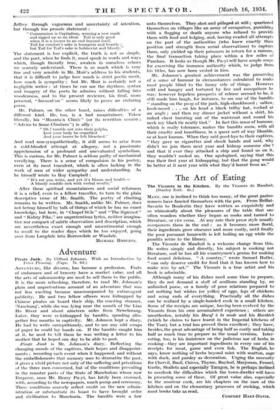Adventure
Pirate Junk. By Clifford Johnson. With an Introduction by Peter Fleming. (Cape. 7s. 6d.)
ADVENTURE, like divorce, has become a profession. Feats of endurance and of bravery have a market value, and all the arts of salesmanship are used to sell them to the public. It is the more refreshing, therefore, to read Mr. Johnson's plain and unpretentious account of an adventure that was not less exciting because unaccompanied by extravagant publicity. He and two fellow officers were kidnapped by Chinese pirates on board their ship, the coasting steamer, `Nanchang', while she was lying near the mouth of the Liao Ho River and about nineteen miles from Newchwang. Later, they were re-kidnapped by bandits, spending alto- gether five months in captivity. Mr. Johnson kept a diary. He had to write surreptitiously, and to use any odd scraps of paper he could lay hands on. If the bandits caught him at it, he used to tell them he was writing a letter to his mother that he hoped one day to be able to post.
Pirate Junk is Mr. Johnson's diary. Reflecting the changing moods of the captives, their hopes and disappoint- ments ; recording each event when it happened, and without the embellishments that memory uses to dramatize the past, it gives a vivid picture not only of the suffering and privations of the three men concerned, but of the conditions prevailing in the remoter parts of the State of Manchukuo whose new Emperor, once Mr. Henry Pu-yi, has lately been crowned, with, according to the newspapers, much pomp and ceremony. These conditions scarcely reflect credit on the new admin- istration or substantiate its boast to have brought order and civilization to Manchuria. The bandits were a law unto themselves. They. shot and pillaged at will ; quartered themselves on villages like an army of occupation, punishing with a flogging or death anyone who refused to provide them with food and lodging, and, having evaded all attempts on the part of the authorities (who knew exactly their position and strength from aerial observations) to capture them, only yielded up their prisoners in return for a ransom, the final transaction taking place within a few miles of Panshan. It looks as though Mr. Pu-yi will have ample scope for exercising the immense authority which, to judge from his titles, has now been vested in him.
Mr. Johnson's greatest achievement was the preserving of a sense of humour in circumstances calculated to make most people blind to the funny side of things. However cold and hungry and tortured by lice and mosquitoes he was; however hopeless prospects of release seemed to be, it still made him laugh, for instance, to see one of the bandits " standing on the poop of the junk, high-cheekboned ; sallow, hook-nosed . . . on his head a black trilby hat, Cocked at an angle ; and then my dinner jacket without a shirt, his naked chest bursting out of the waistcoat and round his neck my black tic neatly tied." In fact this sense of humour, which is really tolerance, makes the bandits seem, with all their cruelty and beastliness, in a queer sort of way likeable, or at least human. When they said good-bye to their captives, " they gave us cigarettes and shook hands and said, why didn't we join them next year and kidnap someone else ? and that if ever they attacked a ship and found us on it, they wouldn't molest us. One apologized, saying that this was their first year at kidnapping, but that the gang would be better at it next year with what they'd learnt from us."










































 Previous page
Previous page